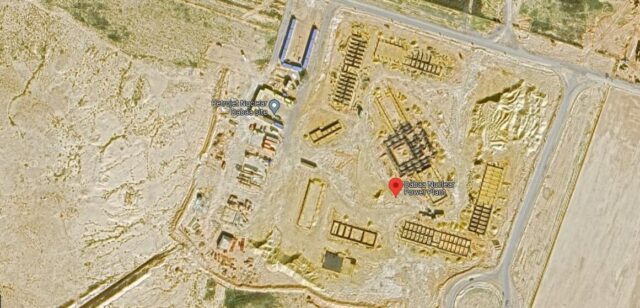Russia-Egypt Strengthen Their Relations Thanks to El Dabaa Nuclear Power Plant

Geopolitical Report ISSN 2785-2598 Volume 38 Issue 17
OSINT Team
The participation of Vladimir Putin and Abdel Fattah al-Sisi in the ceremony for the fourth unit of Egypt’s El Dabaa nuclear power plant underscores the strategic significance of Russo-Egyptian collaboration.
The project, led by Rosatom, marks a milestone in Russia’s involvement in Africa, signifying an expanding geopolitical influence.
President Al-Sisi’s consistent efforts to strengthen ties with Russia, particularly in the economic, military, and energy sectors, reflect a deliberate shift away from Western alliances.
The nuclear power plant’s construction progress, ahead of schedule, reinforces its status as a Russian flagship initiative on the African continent.
Background Information
On January 23rd, 2024, Russian President Vladimir Putin and Egypt President Abdel Fattah al-Sisi participated in a videoconference for the ceremony marking the start of concrete pouring into the foundation of power unit No. 4 of the Egyptian El Dabaa nuclear power plant.
The El Dabaa nuclear power plant, situated in Matrouh province on Egypt’s Mediterranean coast, represents Rosatom’s pioneering venture into Africa. The project aims to have four VVER-1200 reactors operational by 2028, supported by a comprehensive collaboration involving nuclear fuel supply, personnel training, and maintenance and repairs during the initial decade of each unit’s operation.
The Russian Industrial Zone in East Port Said, part of the broader Russo-Egyptian cooperation, demonstrates the multifaceted nature of their economic collaboration, with bilateral trade reaching $6.2 billion in 2022.
El Dabaa NPP and Russia-Egypt Cooperation:
Why does it matter?
The El Dabaa nuclear power plant project holds paramount importance in the realm of global geopolitics, energy security, and bilateral relations, underscoring a confluence of strategic and economic interests for both Russia and Egypt.
- Strategic Significance. Russia’s involvement in the construction of Egypt’s first nuclear power plant marks a decisive step in enhancing its geopolitical influence on the African continent. This move not only signifies the Kremlin’s ambition to diversify its global influence but also strengthens Russia’s role as a reliable partner for African nations seeking to address their growing energy needs.
- Shift in Alliances. President Abdel Fattah al-Sisi’s deliberate efforts to strengthen ties with Russia, especially in economic, military, and energy sectors, highlight a noticeable shift away from traditional Western alliances. In the wake of Western sanctions against Moscow, Egypt’s pragmatic approach to forge a strategic partnership with Russia shows how the Ukraine conflict affected the world of international relations and created the multipolar world often promoted by Moscow and Beijing.
- Economic Implications. The nuclear power plant project represents a substantial contributor to economic growth and bilateral trade considering the complicated economic situation which Egypt has been facing. The successful and ahead-of-schedule progress on the El Dabaa project has already catalysed a 60% increase in trade between Russia and Egypt over the last three years. Beyond the energy sector, the collaborative initiatives, such as the Russian Industrial Zone and railway network cooperation, underscore the multifaceted nature of their economic partnership, bringing forth opportunities for job creation, technology transfer, and sustainable economic development in both nations.
- International Credibility. The El Dabaa project enhances Russia’s international credibility in delivering complex, high-profile initiatives on the global stage. The successful construction of a nuclear power plant, ahead of schedule, showcases Russia’s commitment and technical prowess, solidifying its reputation as a reliable partner for large-scale international projects. This not only boosts Russia’s influence in Africa but also attracts attention from other regions seeking advanced technological solutions, thus expanding the horizons of its global collaborations.
Read more | Potential risks facing businesses operating in Egypt |
So What?
The potential future dynamics associated with the El Dabaa nuclear power plant project might affect African geopolitical dynamics and support Moscow’s desire to become a key player of the continent and, therefore, find alternative markets for its export to counter Western sanctions.
A smooth implementation of the project could not only merge Russo-Egyptian relations but serve as a model for cooperation, showcasing Russia’s advanced technical capabilities and opening avenues for further collaborative ventures in the region.
The success of El Dabaa might redefine the dynamics of power and influence, enhancing the competition between Moscow and the West in North Africa and the African continent.
Conversely, regional tensions are looming as a plausible scenario. The El Dabaa project could potentially face diplomatic challenges or economic repercussions because of the heightened geopolitical tensions in the Middle East and North Africa, which might cast a shadow over its progress.
Financial strain emerges as a critical aspect. Any economic downturn or unforeseen financial challenges, a condition that Egypt experienced in the past and is not immune, could not only jeopardise the timely completion of the El Dabaa project but also have broader implications for the economies of both nations.
For those with an interest in acquiring comprehensive insights into the geopolitical dynamics of Russia-Egypt relations, we encourage you to reach out to our team by sending an email to info@specialeurasia.com. We are poised to facilitate an assessment of the opportunity for you to obtain a meticulously crafted and specialised report tailored to your intelligence needs.
